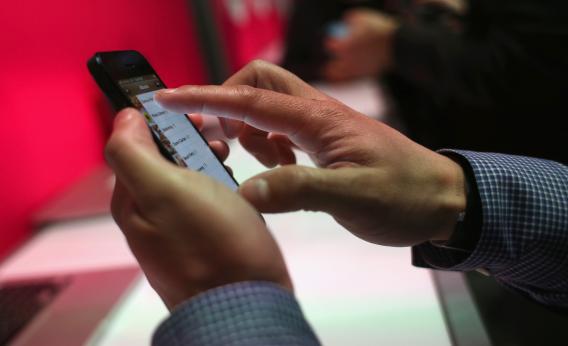In the New York Times this week, psychologist Barbara L. Fredrickson poses a horrifying dilemma to the touch-screen generation: your phone or your heart. The more time we spend “bent over a digital screen, thumbing a connection to somewhere else,” Fredrickson argues, the more our biological ability to engage in “the world of real social encounters” withers away. In other words, with every <3 we type, we
Her evidence? Fredrickson enrolled a group of people in a “workshop on an ancient mind-training practice known as metta, or ‘lovingkindness,’ that teaches participants to develop more warmth and tenderness toward themselves and others.” Six weeks later, she found that “the meditators not only felt more upbeat and socially connected” than those who didn’t attend the workshop, “but they also altered a key part of their cardiovascular system called vagal tone,” a biological measure of the “brain-heart connection” which informs our “capacity for connection, friendship and empathy.”
So people who engage in some new-age exercises enjoy some pretty trippy results. What does that have to do with your phone? Nothing, because Fredrickson didn’t enroll anyone in an iPhone-only lovingkindness regimen to compare vagal readings with the IRL set. She just assumes virtual communication is inherently less connected, friendly, and empathetic than the alternative. “When you share a smile or laugh with someone face to face, a discernible synchrony emerges between you, as your gestures and biochemistries, even your respective neural firings, come to mirror each other,” she writes. “It’s micro-moments like these, in which a wave of good feeling rolls through two brains and bodies at once, that build your capacity to empathize as well as to improve your health.” Stare too hard at the screen, she concludes, and you could “lose the capacity for humanity.” She also warns against the dangers of “texting while breast-feeding.”
I came across Fredrickson’s analysis after my friend Nathan Jurgenson tweeted his own smart critique of her piece. I say Nathan’s my friend, but by Fredrickson’s standards, he is siphoning off my very lifeblood in the service of charging his Apple-issued heart replacement. We’ve met in person maybe once, but years later we still email and tweet and Facebook chat to each other because, thanks to technology we both share, we’re able to forge micro-moments of connection with one another though we have no “real” interaction. Are we tearing apart our brain-heart connections by not talking face-to-face? I’ve got a pocket full of highly evocative emoji combinations that suggest otherwise.
As Hanna Rosin laid out in the Atlantic last week, the cognitive effect of omnipresent touch screens on the minds of children remains largely undocumented. But there’s some evidence that as technology becomes more interactive—as kids stop watching one-way TV shows and start noodling with responsive iPad games—screens could actually aid in their cognitive development. If technology is really stunting our brains, or our hearts, that’s a problem that technology could solve. The emotional potential of shared screen time is advancing every day. While aging Internet users are still dutifully updating their virtual resumes on Facebook, younger users are migrating to highly visual and auditory applications like Instagram, Snapchat, Vine, and Pheed. These apps—and the millions of selfies they’ve launched—have been accused of fueling hypersexual narcissism among today’s teenagers. But they actually enable us to converse virtually similarly to how we interact in real life. The connections forged on a self-destructing Snapchat scribble, an ever-looping Vine video, or a text wall of emojis are spontaneous, intimate, creative, emotional, and very much face-to-face (even if those faces are thousands of miles away).
The more we flex our thumbs, the more satisfying the emotional rewards. Just the other day, a wave of good feeling rolled through two brains and bodies at once as Nathan and I traded jokes about op-ed writers with a scientifically unsupportable fetish for the IRL. If Fredrickson can’t see the human potential of the online friendship, maybe it’s because she hasn’t been looking hard enough.
